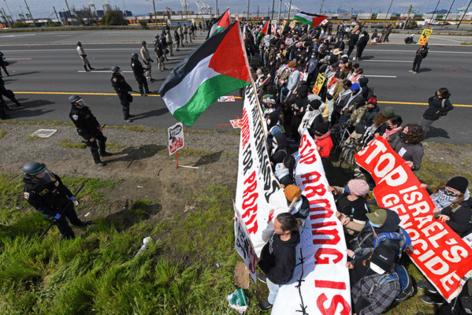Should protesters pay the price? Snarled Golden Gate Bridge and I-880 bring up questions about tougher penalties
Published in News & Features
SAN JOSE, Calif. — Protests over the Gaza war that snarled San Francisco’s Golden Gate Bridge and Interstate 880 in Oakland for hours Monday inflamed tempers, led to dozens of arrests and drew a finger-wagging from Gov. Gavin Newsom.
“I hope we don’t see it again,” Newsom said, “and I do think people need to be held to account for their actions.”
The governor didn’t say what penalty would be appropriate and declined to elaborate. But after years of disruptive and sometimes destructive protesters often getting a slap-on-the-wrist treatment in the courts, his comments reflect growing calls for tougher consequences from the public and legislators.
“People are sick and tired of these protesters blocking highways,” said Assemblywoman Kate Sanchez, a Republican from Rancho Santa Margarita, who has introduced a bill to increase fines for protesters who obstruct a highway where they could impede emergency vehicles. “When they hold up traffic, they prevent first responders from responding to emergencies and jeopardize the safety of innocent people. Sacramento needs to get tougher on these adult temper tantrums. Enough is enough.”
Authorities booked Monday’s bridge protesters on unusual criminal conspiracy charges that kept them jailed 48 hours while prosecutors weighed charges. And San Francisco District Attorney Brooke Jenkins this week took the extra step of urging motorists on social media to contact authorities if they were “trapped on the Golden Gate,” advising that they may be “entitled to restitution” — something that could increase penalties the protesters must pay.
These new measures have alarmed civil rights lawyers. The San Francisco Public Defender’s Office criticized Monday’s bridge protest arrests as “a form of state violence” that seeks to “chill the exercise of First Amendment rights.”
“Peaceful protests are a time-honored American tradition and will never stop,” the Public Defender’s Office said. “While blocking roadways — like Dr. (Martin Luther) King did during the Civil Rights movement — is inconvenient for drivers, nonviolent protest alone does not constitute criminal activity.”
The bridge and freeway protests unfolded amid a larger debate over crime and punishment in the Golden State. A series of laws and initiatives over the last 15 years were aimed at depopulating overcrowded California prisons.
San Francisco voters in 2022 recalled San Francisco District Attorney Chesa Boudin, and Alameda County District Attorney Pamela Price learned this week that she, too, will face a recall vote — both progressive prosecutors have been criticized as soft on crime. And critics this week submitted signatures to qualify a November ballot measure amending Proposition 47, a 2014 measure that lowered drug and theft penalties.
But protesters, even when their disruptions violate laws, invoke First Amendment rights and often a measure of sympathy for their cause, forcing government officials to tread carefully between maintaining public order and preserving free speech, said Larry Gerston, political science professor emeritus at San Jose State University.
...continued
©2024 MediaNews Group, Inc. Visit at mercurynews.com. Distributed by Tribune Content Agency, LLC.







Comments